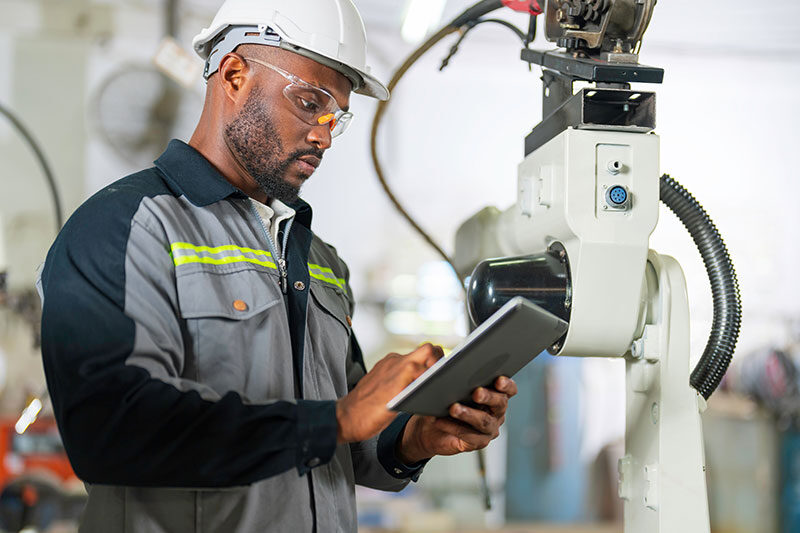
The world of manufacturing is changing – and changing fast. Tablets and smartphones are becoming factory floor essentials – much like the coal-fired steam engine during the 1st industrial revolution, the implementation of the assembly line in the 2nd revolution and computers in the 3rd revolution. 21st century technology and digital transformation have enabled the shift into Industry 4.0.
When did industry 4.0 start?
Industry 4.0 has been talked about since the start of the Industrial Internet of Things (IIoT) and began to gain traction around 2018. Put simply, Industry 4.0 is automated communication between machines and computers over a Cloud-connected network.
There are a number of facets to the concept – M2M Learning, AI, additive manufacturing such as 3D Printing, autonomous robotics and data management to name a few – but at the heart of the concept is tech-driven efficiency and productivity. In a nutshell, working smarter in every area of production to reduce waste, save time and increase margins.
What are the benefits of Industry 4.0 in manufacturing?
- Increased productivity. Identifying bottlenecks in production can decrease production times, and predicting maintenance with smart machines can mitigate production issues before requiring shut-down.
- Greater profitability. Automating order processing, materials handling, repetitive assembly tasks and supply chain tasks will speed up production times and improve the consistency and quality of the product. Less wasted time and materials, coupled with lower margins for error, mean greater profit.
- Better data. As communication between machines improves, so does big data collection. The ability for computers and people to turn data into insight can improve operations – with the net result of hitting sustainability and efficiency targets.
- Increased competitiveness. The US, Western European and Australian markets can benefit from Industry 4.0 technology investments that lower the costs of domestic production. This competitive edge allows a more manageable supply chain – keeping the manufacturing facility in closer proximity to consumer demand while also supporting the local economy.
- Future proofing. In a post-pandemic McKinsey & Co survey of global industry, 94% of businesses surveyed stated that digital technologies allowed them to continue to function effectively during the COVID crisis. Conversely, those who had been slow to adopt technology – or even those who were still pondering the benefits of Industry 4.0 in manufacturing – fared significantly less well.
What is data management in manufacturing?
One way manufacturing facilities are working smarter is by utilising digital management systems that ensure each industrial component is working at maximum efficiency. It is like individual components taking responsibility for their own health. To embrace this process, industry is undertaking a rapid transition to what is known as CMMS (Computerised Maintenance Management Software) and more recently EAM (Enterprise Asset Management).
The smart machines, enabled with CMMS and EAM, require two other vital components to complete the successful implementation of Industry 4.0 in manufacturing. The first of these is The Cloud – the centralised storage hub for data that can be accessed from anywhere with an internet connection. This centralisation integrates each part of the product journey from manufacture through to customer delivery – all stored safely and securely. The final piece of the puzzle are the handheld devices that provide the link between man and machine.
The value of mobile devices for Industry 4.0 in manufacturing.
From as early as 2015, CEOs of manufacturing businesses recognised the importance of mobile technology in improving industrial processes. In a PWC survey of manufacturing CEOs, mobility was considered the top tech priority. Since that time, as devices have become more accessible, more robust, and more powerful, they have become essential for facilitating Industry 4.0.
Mobile devices in manufacturing provide:
- Portable and cost-effective tech to connect the component parts of the manufacturing process.
- Real-time interaction between managers, maintenance teams and machines.
- Powerful operating systems that enable complex applications such as augmented reality to facilitate problem solving and output planning.
- Familiarity which reduces training time and increases adoption rates.
How are smart charging lockers being used in smart manufacturing?
Mobile device hardware provides the interface that delivers the information into the hands of human decision makers, and it is this part of the process that is vulnerable to loss, theft, breakage and mismanagement.
Traditional approaches to sharing hardware between shift workers can result in devices going missing, not being charged or not being updated regularly. With a simple adjustment toward providing centralized device management and storage, these issues can be overcome.
Real world application of smart lockers in manufacturing.
Blédina, an infant food brand owned by Danone France, has been working with PC Locs on managing mobile device on their factory floor. Devices are being used by engineers to report issues on a production line to a remote manager. The engineer can receive a solution on the device and troubleshoot immediately.
Mobile devices are critical to this process so devices must be accessible, charged, and secure when needed. In tandem with the Poka web and mobile app, Blédina uses FUYL Tower Smart Lockers powered by PC Locs Cloud to improve employee efficiencies and deliver an effective device management program.
Factory workers and engineers can easily check out a device from a FUYL Tower at the beginning of their shift, without manager oversight. Tower access is tracked via the PC Locs Cloud portal so managers know when a device was taken and if it has been returned. Device accountability for employees can deter device loss, theft and mismanagement.
The time saving benefits of intuitive, simple-to-use hardware and straightforward processes have led to eager adoption and tangible efficiency benefits. As one of the world’s leading B Corporations, going paperless and 100% digital was a critical pillar of Danone’s business strategy that has been enabled with PC Locs’ Smart Locker solution.
Schedule a Product Demo
Schedule a demo or a call with a PC Locs team member to get a closer look at how our products help make your life easier.
Contact Us Now